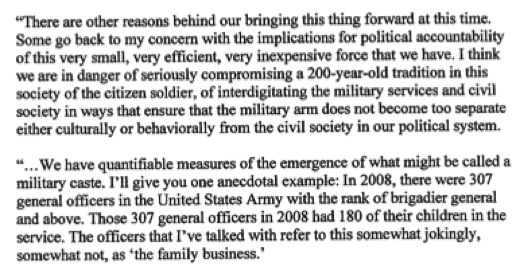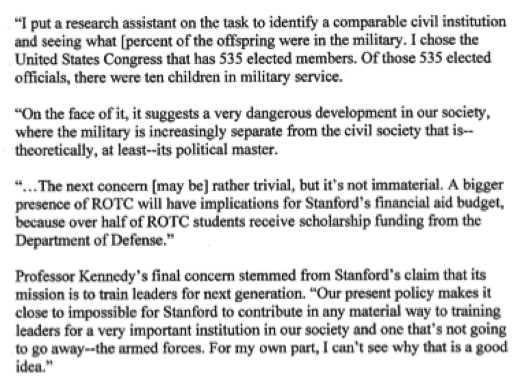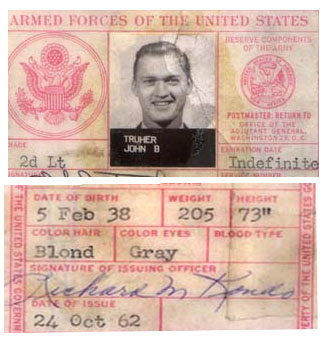Stanford Report announcement:
ROTC Forum on Thursday at Stanford

Note: This meeting is for "faculty and staff, Alumni and Friends", i.e. come any and all.
Stanford University Ad Hoc Committee on ROTC, which includes:
1
Letter to Stanford Community: Thoughts on possible relations between Stanford University and ROTCwhich includes
"In October 1968, when sentiment against the country's conduct of the Vietnam War was high, the Stanford Faculty Senate appointed an Ad Hoc Committee on ROTC to examine whether "proper relations between the ROTC departments and Stanford may be established by review and reform of the present relations." In February 1969, the Senate by a 25 to 8 vote accepted the Ad Hoc Committee's recommendation that, by 1973, the university phase out all academic credit for ROTC programs and academic rank for military staff."
"This was followed later that month by a student referendum in which Stanford students voted 2106 to 1387 that "ROTC has a legitimate place on the campus and deserves the support and credit from the University for all those parts of the program that are of genuine academic interest." "
Comment by Truher: The use of the word "referendum" is misleading. Participation in "Student Government" is a misnomer, a misuse of reasonable interpretation of democratic engagement. Students are in a subordinate, generally powerless, and deliberately disorganized status, with their own compliance. The result self-selection of participants in such pollings. Whether any part of ROTC is of "genuine academic interest" is highly questionable. It is more appropriate to ask whether U.S. military conduct in the modern era is "of genuine criminal interest." What proposition put to which students was biased at the onset, by distortion due to self-selection of participants.
2
ROTC committee members
3
Stanford University ROTC Departments: A Report and Recommendations, February 7, 1969
4
Log on ROTC at Stanford 1968-1973, by Donald Winbigler, September 12, 1973
5
"Corps Curriculum" by Joshua Davis, Stanford Magazine, Jan/Feb 2002
6
Excerpt from March 4, 2010 Faculty Senate Minutes
Contact: rotc_2010@stanford.edu
Of the arguments-pro in the documents above, the only one I find worth considering is by history professor, Prof David Kennedy. The text is available only as an image, so that's here:


Where Kennedy and most readers would disagree is his assumption that contemporary U.S. military conduct, with its imperialistic objectives of full spectrum dominance is comparable to what he finds worthwhile in the historic record. Read about the U.S. Space Command, Vision 2020, for the functional plans. I am a graduate of Stanford ROTC program. My experience was as a lieutenant in the Army, in the Nike Defense System. My later considerations are available. The distortions of function and purpose have become so horrendous in the modern era that the only result of restoring ROTC at Stanford would be to sanction the continued use of military terror and intimidation on a world-wide scale, as extended decades into the future by allies of the hawks at Stanford who would control the war-making apparatus, for all the suspect purposes that might otherwise be studied.
There certainly are important military trends to study, but those sworn to follow orders are least enabled to study them. The U.S. Joint Chiefs of Staff released a report intended to define "Full Spectrum Dominance" through the year 2020, without ever saying even remotely what is the purpose of all this. Within the contemporary context, Professor Kennedy's concerns about loss of the "200 years old tradition...of the citizen soldier" doesn't address the more blatant distortions of power that threaten the future of mankind.
Others have, but we tend to be overwhelmed by those who would have us recapture a tradition of civilian control which no longer exists, if it ever did. Where does it all end.
-- Jack Truher 2011-01-11
